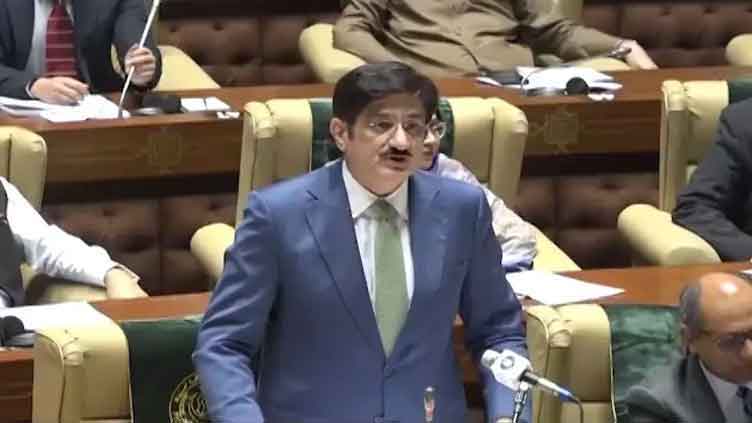CM Murad unveils Rs3,451bn Sindh budget 2025-26

Business
Employees from Grade 17 to 22 will receive a 10% ad-hoc relief.
Employees from Grade 17 to 22 will receive a 10% ad-hoc relief.
An 8% increase in pensions has been approved.
A total of Rs2,149.4 billion has been allocated for current expenditures.
KARACHI (Dunya News) – Sindh Chief Minister Murad Ali Shah on Friday presented a provincial budget of Rs3,451 billion for the fiscal year 2025-26 in the Sindh Assembly.
Addressing the budget session, Murad Ali Shah said that the budget includes measures to modernise governance and boost the economy.
He stated that additional funds have been allocated for education, health, infrastructure, and welfare sectors. The total budget size for the fiscal year 2025-26 has been set at Rs3,451 billion.
“It is an honor to serve the great people of Sindh,” he added, announcing an 8% increase in pensions.
Highlighting his long tenure, Murad Ali Shah said, “It is a matter of pride for me to present Sindh’s budget for the 10th time.” He also mentioned that he has presented the provincial budget 12 times in the Sindh Assembly.
Meanwhile, the opposition staged a strong protest in the Sindh Assembly, chanting loud slogans.
Murad Ali Shah said, “As long as I have the trust, I will continue to present Sindh’s budget.”
Sindh Chief Minister Murad Ali Shah announced the following during the provincial budget speech:
- Conveyance allowance has been increased for disabled employees.
- An 8% increase in pensions has been approved.
- Employees from Grade 17 to 22 will receive a 10% ad-hoc relief.
- Employees from Grade 1 to 16 will get a 12% ad-hoc relief allowance.
- Increased grants to hospitals and universities have contributed to higher current expenditures.
- A total of Rs2,149.4 billion has been allocated for current expenditures.
- The budget also includes initiatives to modernize governance and boost the economy.
- Additional funds have been set aside for education, health, infrastructure, and the welfare sector.
Despite facing IMF restrictions, Sindh Chief Minister stated that the government has achieved record development milestones. He emphasized that increased funding was allocated to critical sectors such as health and education, with public welfare once again being the government’s top priority.
This year alone, Rs344 billion were spent on the health sector. Major institutions saw remarkable progress—NICVD treated more patients than any other facility in Pakistan, while SICVD expanded its extensive hospital network. At the Gambat Institute, 308 liver transplants were successfully conducted.
SIACH is now recognized as the world’s largest children’s health network, providing high-quality care. At JPMC, the number of beds has doubled in just two years. Jinnah Hospital stands out globally as the only place offering free CyberKnife treatment.
Meanwhile, construction is underway on the Bilquis Abdul Sattar Edhi Breast Radiology Hospital. SIUT has emerged as South Asia’s largest public health institute and also houses Pakistan’s largest dialysis center.
The chief minister announced an increased budget allocation for law and order this year, highlighting a notable decline in crime as a result of effective government measures.
Street crime in Karachi has decreased, and successful operations in riverine areas have thwarted several criminal activities.
Addressing the ongoing war against drugs, the chief minister emphasized that the campaign is not only about cracking down on drug dealers—many of whom have been arrested—but also about protecting the youth.
To strengthen public safety, AI-powered surveillance cameras have been installed on highways, and multiple traffic reforms have been introduced.
In a major step towards police strengthening, over 25,000 personnel have been newly recruited. Healthcare services for law enforcement have been expanded, the Shuhada (martyrs) package has been increased, and police stations have been given direct funding along with financial authority for SHOs.
On the youth empowerment front, the government has initiated IT-based training programs to equip young individuals with employment-ready skills.
A plan is in place to train 35,000 students next year. The education budget has also seen a significant boost, with increased funding for the Sindh Education Foundation. Additionally, with support from UNICEF, thousands of schools across the province have been renovated to improve the learning environment.


